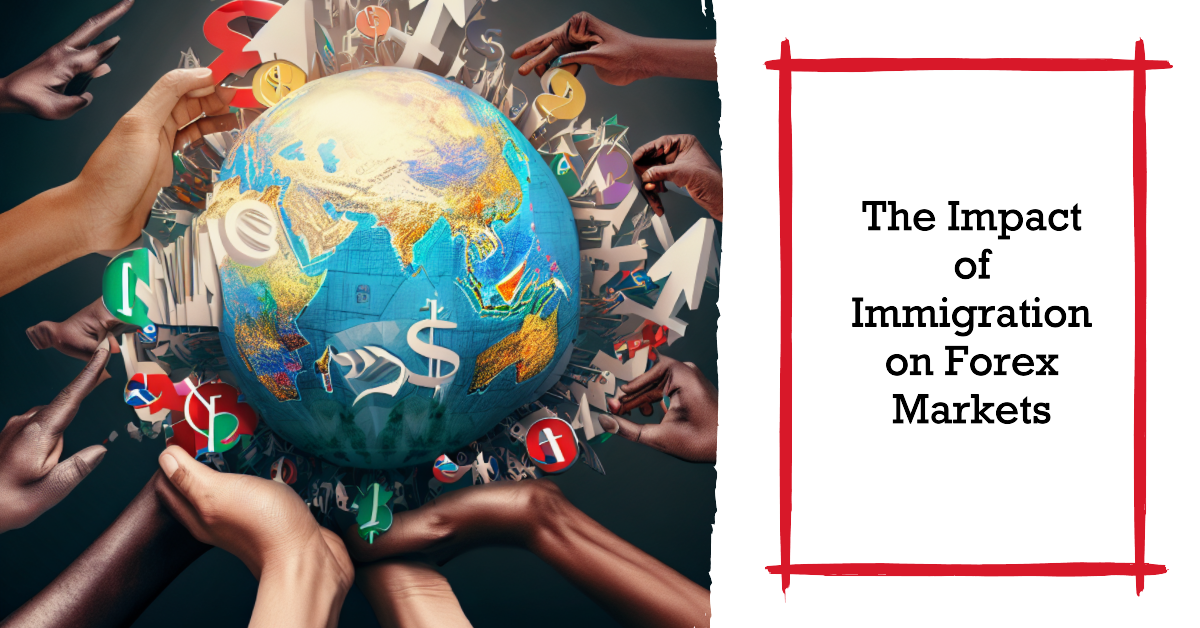
The Impact of Immigration on Forex Markets: A Detailed Analysis
- Jonny Smith
- August 1, 2023
- Uncategorized
- 0 Comments
Introduction
Welcome to the fascinating world of financial markets, where the interplay of various elements shapes global economic trends. Have you ever thought about the butterfly effect immigration could have on the world’s largest and most fluid market – the Forex market? Surprising as it may sound, these two vastly different arenas do intersect. So buckle up, as we’re about to embark on an intriguing journey that will unravel this complex relationship.
Background and Basics
Before we dive headfirst into the intricacies, let’s take a moment to brush up on some basics. The Forex market, or Foreign Exchange Market, is a bustling international marketplace where currencies are bought and sold. It’s like the Grand Bazaar of global currencies, with major players including banks, corporations, and even countries.
Now, think about immigration. From the hustle and bustle of New York City to the multicultural mosaic of London, migration has been a driving force in shaping our societies. Every year, millions of individuals pack up their lives in search of better opportunities, contributing to the ever-evolving global immigration trends.
But what does moving across borders have to do with the Forex market? As it turns out, quite a bit. Immigration can have a significant impact on a country’s economy, affecting everything from labor markets to GDP growth, which can, in turn, sway currency values. How, you ask? Let’s delve deeper.
Direct Impact of Immigration on Forex Markets
Demand for Currency
Imagine this: you’re moving from India to the United States for a job opportunity. To settle in, you’ll need to convert your rupees into dollars, right? Now multiply that by the thousands of immigrants making similar moves. This increased demand can potentially bolster the value of the destination country’s currency in the Forex market.
The Role of Remittances
Don’t forget the money immigrants send back home, known as remittances. Picture our friend from India now comfortably settled in his new job in the US, regularly sending money back to his family. This transfer can lead to increased demand for the home country’s currency and affect its value in the Forex market. A tangible example? Consider the impact of Mexican immigrants in the US and their remittances on the USD/MXN exchange rate.
Impact on Interest Rates
But there’s more. Immigration can influence interest rates. As immigrants contribute to economic growth, central banks may adjust interest rates, affecting the value of a nation’s currency. Remember, in the Forex market, higher interest rates can attract foreign investors looking for better returns, pushing the currency value up.
Indirect Impact of Immigration on Forex Markets
This impact isn’t just a straight line; it’s a web of interconnections. Let’s explore the corners of this web a bit more.
Immigration and Economic Growth
Immigrants contribute to a country’s economy, whether it’s through their labor, entrepreneurship, or simply their consumption. This economic growth can strengthen a country’s currency in the Forex market. Think about the power of the Euro and the role of EU immigration in shaping it.
Changes in the Labor Market
Immigrants can bring diverse skills, impacting labor markets. They can fill gaps in both low and high-skilled areas, influencing productivity, wage levels, and, indirectly, the Forex market.
The Inflation Factor
And what about inflation? Well, depending on the scale and nature of immigration, it can either push up inflation by increasing demand or dampen it by expanding the labor force and productivity. In the Forex world, lower inflation can weaken a currency’s value, while higher inflation could potentially strengthen it.
Factors Modifying the Impact of Immigration on Forex Markets
Yet, the impact of immigration on Forex markets isn’t set in stone. Various other factors can shape this dynamic. For instance, the government’s stance on immigration can significantly influence its economic and hence Forex impact. And then, there’s market sentiment – how traders perceive the effects of immigration can sway Forex markets. Additionally, the state of the economic cycle can either amplify or diminish the impact of immigration on Forex markets.
Current and Future Perspectives
With that background, let’s shift our gaze to recent trends and future perspectives. Have you noticed the global immigration patterns changing recently? The shifting political, economic, and environmental landscapes have significantly affected these trends.
On the economic front, the advent of technology and the rise of remote work have started to change traditional labor migration patterns. These changes have unique implications for the Forex markets and are worth watching for signs of new trends.
Looking into the future, experts predict increasing immigration due to factors like economic disparities and climate change. This evolving landscape will undoubtedly have ramifications for Forex markets. To put this in context, think about potential mass migration due to rising sea levels. This could create significant demand for certain currencies and shift the Forex markets in ways we can only begin to imagine.
Potential Forex Strategies
Given all this, how can traders navigate the Forex market? Here are some insights. Traders can keep an eye on immigration trends and data, government policies, and economic indicators to anticipate potential market movements. They can also take advantage of significant immigration events that could trigger short-term market volatility. Remember, while Forex trading involves risks, a well-informed strategy can potentially reap substantial rewards.
Conclusion
So, we’ve come full circle on our journey to understanding the relationship between immigration and the Forex market. As we’ve seen, these two seemingly disparate elements are, in fact, interwoven in complex and intriguing ways. Immigration, directly and indirectly, impacts Forex markets, shaping currency values and consequently, the global economy.
For Forex traders, keeping a pulse on immigration trends can provide invaluable insights. Meanwhile, for policy-makers, recognizing the Forex implications of immigration can guide more comprehensive and balanced policies. In the grand scheme of things, understanding this relationship equips us better to navigate our interconnected world.








